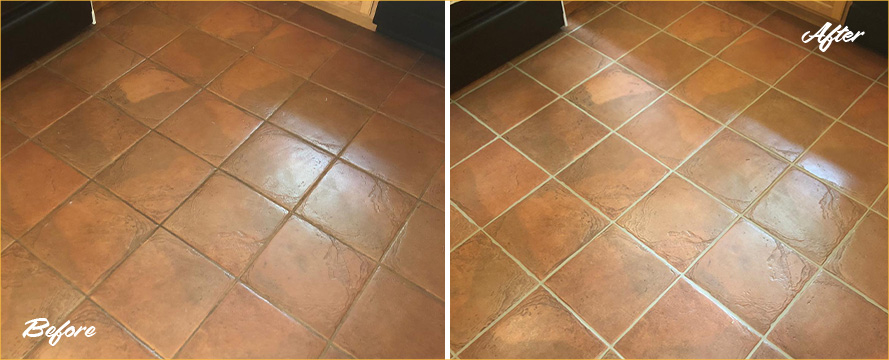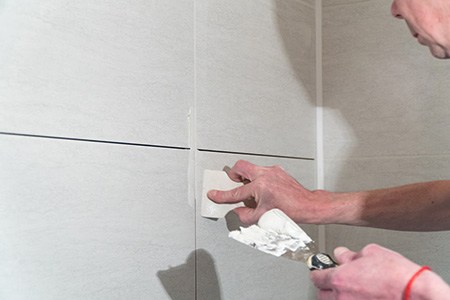Imagine this: you’ve just finished installing beautiful new floor tiles, admiring the sleek design and the fresh, clean grout lines. Then, you start noticing stains appearing on the grout, a dullness settling in, or even mold growing. It’s a nightmare scenario for any homeowner. But before you panic, there’s a simple solution: sealing your grout.

Image: cinvex.us
Sealing grout is a crucial step in maintaining the beauty and longevity of your tiled floors. It acts as a protective barrier, preventing dirt, stains, moisture, and mold from entering the porous grout, keeping it looking pristine for years to come. But with so many types of grout sealers and varying tile installations, determining whether you need to seal your grout can be confusing.
Understanding the Need for Grout Sealing
What is Grout Sealing?
Grout sealing involves applying a protective layer over the grout lines to create a barrier against various elements. This layer typically consists of a liquid sealant that penetrates the pores of the grout, forming a durable coating.
Why Seal Grout?
Grout is a porous material, meaning it has tiny openings that can absorb liquids, dirt, and even mold spores. This porosity makes it highly susceptible to staining and discoloration, especially in high-traffic areas. Sealing provides several benefits:
- Protection against stains: Prevents spills, food splatters, and other common household messes from staining the grout.
- Enhanced cleaning: Sealed grout repels dirt and grime, making cleaning easier and more effective.
- Mold and mildew resistance: Provides a barrier against moisture, preventing mold and mildew growth, especially in humid environments.
- Increased longevity: Protects the grout from wear and tear, preserving its beauty and extending its lifespan.

Image: worstroom.com
Do I Really Need to Seal My Grout?
The need for grout sealing depends on several factors:
- Grout Type: Porous grouts, such as cement-based grouts, require sealing. Non-porous epoxy grouts are naturally stain-resistant and may not need sealing.
- Tile Type: Natural stone tiles, such as marble and travertine, often have porous grout lines that need protection.
- Location: Areas prone to spills and moisture, such as kitchens, bathrooms, and entryways, benefit greatly from grout sealing.
- Traffic: High-traffic areas, like hallways, experience more wear and tear, making sealing essential.
Types of Grout Sealers
Water-Based Sealers
Water-based sealers are a popular choice for their ease of application and low odor. They penetrate the grout pores, forming a breathable barrier.
Solvent-Based Sealers
These sealers offer greater durability and stain resistance. They are typically stronger and less likely to be affected by moisture.
Epoxy Sealers
Epoxy sealers are known for their exceptional durability, offering superior protection against stains and chemicals. They are especially suitable for high-traffic areas and areas exposed to harsh chemicals.
Tips for Sealing Grout
Prepare the Grout
Before sealing, ensure the grout is clean and dry. Use a grout cleaner to remove any dirt, grime, or soap residue. Allow it to dry completely before applying the sealer.
Apply the Sealer
Follow the manufacturer’s instructions for application. Typically, you’ll apply the sealer with a brush or sponge, taking care to cover all the grout lines evenly.
Let it Cure
Allow the sealer to cure according to the manufacturer’s instructions. This can take anywhere from a few hours to a few days, depending on the type of sealer used.
Maintenance
Once the sealer has cured, maintain the grout by regular cleaning and periodic re-sealing. The frequency of re-sealing depends on the traffic and usage of the area, but it’s generally recommended every 1-3 years.
Expert Advice on Sealing Grout
It’s always a good idea to consult with a professional tile installer or grout specialist before sealing your grout. They can assess the grout type, tile type, and traffic patterns in your home to recommend the best sealing solutions. They can also provide valuable advice on the type of sealer to use, application techniques, and maintenance practices.
FAQ on Grout Sealing
Q: Can I seal grout myself, or do I need a professional?
A: While sealing grout can be a DIY project, it’s essential to have the right skills and tools. If you’re unsure, it’s always best to consult a professional to ensure the job is done correctly.
Q: How long does grout sealer last?
A: The lifespan of grout sealer varies depending on the sealer type, traffic, and cleaning practices. Generally, it can last anywhere from one to three years.
Q: Can I seal grout over old sealant?
A: It’s not recommended to seal grout over old sealant without stripping it first. This can lead to uneven coverage and impede the effectiveness of the new sealant.
Q: What are the best techniques for cleaning sealed grout?
A: Use a mild soap or grout cleaner and a soft brush to clean sealed grout. Avoid harsh chemicals and abrasive cleaners that can damage the sealer.
Do I Need To Seal Grout On Floor Tiles
Conclusion
Sealing grout is crucial for maintaining the beauty and longevity of your tiled floors. It provides protection against stains, dirt, moisture, and mold, making your tiles easier to clean and preserving their appearance. Remember to consider the type of grout and tile, traffic patterns, and the specific needs of your home when deciding whether to seal your grout. Consult a professional if you have any doubts, and enjoy the benefits of a well-maintained tiled floor!
Are you planning to seal the grout on your floor tiles? Share your experience and any insights in the comments below.






